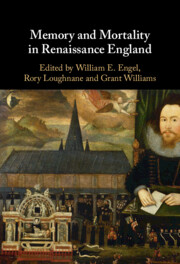Book contents
- Memory and Mortality in Renaissance England
- Memory and Mortality in Renaissance England
- Copyright page
- Dedication
- Contents
- Figures
- Notes on Contributors
- Acknowledgements
- Introduction
- Part I The Arts of Remembering Death
- Part II Grounding the Remembrance of the Dead
- Chapter 5 Memory, Climate, and Mortality The Dudley Women among the Fields
- Chapter 6 Scattered Bones, Martyrs, Materiality, and Memory in Drayton and Milton
- Chapter 7 Theatrical Monuments in Middleton’s A Game at Chess
- Chapter 8 Thomas Browne’s Retreat to Earth
- Part III The Ends of Commemoration
- Parting Epigraph
- Bibliography
- Index
Chapter 5 - Memory, Climate, and Mortality The Dudley Women among the Fields
from Part II - Grounding the Remembrance of the Dead
Published online by Cambridge University Press: 06 October 2022
- Memory and Mortality in Renaissance England
- Memory and Mortality in Renaissance England
- Copyright page
- Dedication
- Contents
- Figures
- Notes on Contributors
- Acknowledgements
- Introduction
- Part I The Arts of Remembering Death
- Part II Grounding the Remembrance of the Dead
- Chapter 5 Memory, Climate, and Mortality The Dudley Women among the Fields
- Chapter 6 Scattered Bones, Martyrs, Materiality, and Memory in Drayton and Milton
- Chapter 7 Theatrical Monuments in Middleton’s A Game at Chess
- Chapter 8 Thomas Browne’s Retreat to Earth
- Part III The Ends of Commemoration
- Parting Epigraph
- Bibliography
- Index
Summary
By 1624, 'through the injury of time and weather', George Montaigne reported, 'there had a general wrack befallen the ancient parish church of St. Giles in the Fields'. The temporal decline of monuments is a common early modern theme, but Montaigne’s indictment of weather’s ill-effects suggests an awareness of the period of climatic change now known as the Little Ice Age. Rather than arguing that climate determined the fate of monuments, this chapter looks beyond cause and effect to describe an interconnection between memory, climate, and mortality as played out in the memorial network created by Alice, Duchess Dudley, and her five daughters. This chapter recovers material and memorial connections joining the Dudley women’s memory work in an ecology that situates the church building and its monuments within a web of social, somatic, and climatic conditions in which these women lived and died. Mobilizing climate as an agent in, rather than a mere a backdrop to, memorial activities redirects the Dudley women’s project from familiar devotional and monumental gestures towards a wider field of social values that both led and responded to environmental changes on a global scale.
Keywords
- Type
- Chapter
- Information
- Memory and Mortality in Renaissance England , pp. 103 - 122Publisher: Cambridge University PressPrint publication year: 2022

